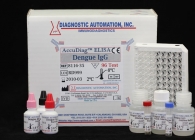
ELISA Kits
- • Anemia ELISA kits
- • Allergy ELISA kits
- • Autoimmune Disease kits
- • Bone Metabolism ELISA kits
- • Blood bank ELISA kits
- • Cancer ELISA kits
- • Cardiac Markers ELISA kits
- • Diabetes Assays ELISA kits
- • Drug test ELISA kits
- • Fertility ELISA kits
- • Food ELISA kits
- • Infectious Disease ELISA kits
- • Other ELISA Kits
- • Parasitology ELISA kits
- • Steroid ELISA kits
- • Thyroid ELISA kits
Rapid Tests
- • Allergy Rapid tests
- • Bone Metabolism
- • Cancer Rapid tests
- • Cardiac markers Rapid tests
- • Drug Tests
- • Fertility Rapid tests
- • Hepatitis Panel
- • Infectious Disease & other tests
- • Other
- • Ovulation Rapid tests
- • Pregnancy tests
- • Urine Reagent Strips tests
IFA Kits
Chemiluminescence Immuno Assays
- • Allergy Assays
- • Autoimmune Thyroid Assays
- • Cardio-Vascular Monitoring
- • Diabetes Assays
- • Fertility Assays
- • Growth Deficiency
- • Infectious Disease Assays
- • Others
- • Steroid Assays
- • Thyroid Assays
- • Tumor Marker Assays
Serology Tests
- • ASO (Anti-Streptolysin-O)
- • CRP (C-Reactive Protein)
- • Mono (Infectious Mononucleosis)
- • RF (Rheumatoid Factor)
- • RPR (Rapid Plasma Reagin)
- • SLE (Systemic Lupus Erythematosus)
Instrumentation



Dengue IgG ELISA Kit
| Name |
Dengue IgG ELISA Test |
|---|---|
| Full name |
Human Dengue IgG ELISA Test Kit, Export Use Only |
| Category Name | Parasitology ELISA kits |
| Test | 96 |
| Method | ELISA method: Enzyme Linked Immunosorbent Assay |
| Principle | ELISA principle - Indirect; Antigen Coated Plate |
| Detection Range | Semi-quantitative elisa assay - Positive, Negative Controls |
| Sample | 5 ul |
| Total Time | ~75min |
| Shelf Life | 12 Months from the manufacturing date |
 |
 |
 |
Dengue IgG ELISA Kit description:
"Export Use Only"
The Diagnostic Automation Dengue IgG ELISA test is a semi-quantitative enzyme immunoassay for the detection of antibodies to dengue, in samples of human serum or plasma.
Materials Provided with Dengue IgG Elisa test kit:
1. Plate: Microwells containing dengue antigens (serotype 1-4)
2. Enzyme Conjugate: anti-human IgG (gamma) conjugated to peroxidase
3. Positive Control: diluted positive human serum
4. Negative Control: diluted negative human serum
5. Chromogen: TMB
6. Wash Concentrate 20X: concentrated buffer and surfactant
7. Dilution Buffer: buffered protein solution
8. Stop Solution: 1 M phosphoric acid
Materials & Instrumentations required not included:
1. Precision pipettes
2. Distilled or deionized water
3. EIA kit Microplate Washer
4. EIA kit Microplate Reader with a 450 nm/620 - 650 nm filter
Dengue IgG Elisa Kit Background Information
Dengue fever, caused by any of the four serotypes of dengue virus, is endemic in Southeast Asia as well as South and Central America. Repeat infection with a second type of dengue virus is thought to cause dengue hemorrhagic fever in about 10 percent of infected people. Dengue antibodies do not confer immunity beyond 3-6 weeks to a second dengue type. Symptoms of classical dengue fever, following a 5-8 day incubation period, include rash, severe headache, nausea, vomiting, chills, malaise, macular rash and may include lymphadenopathy. Hemorrhagic dengue fever involves increased blood vessel permeability which can lead to shock and death in about 10% of reported cases. Dengue fever can only be treated by supportive care and is prevented by mosquito control. In primary infections, circulating IgM antibody to the viral coat proteins is detected 5-6 days after the onset of illness, and gradually decreases within 1-2 months of onset. IgG antibody to dengue virus is detected approximately 14 days after onset in primary infections, and by day 2 in secondary infections. In secondary infections, IgM antibody may reappear but gradually diminishes, while IgG antibody persists, often at high titer. These patterns of dengue antibody development permit serological differentiation of primary and secondary infections. Characteristically, acute patients with primary infections have a higher IgM:IgG ratio than are found in secondary infections. Patients with secondary infections generally have higher IgG levels. Acute or recent infections are identified by a rise in antibody titer as well as high IgM levels.
Dengue IgG Elisa Test Principle:
The microwells are coated with purified dengue virus antigen from cell cultured type 1-4 dengue. During the first incubation with the diluted patients sera, any antibodies which are reactive with the antigen will bind to the coated wells. After washing to remove the rest of the sample, the Enzyme Conjugate is added. If antibodies have been bound to the wells, the Enzyme Conjugate will then bind to these antibodies. After another series of washes, a chromogen (tetramethylbenzidine or TMB) is added. If the Enzyme Conjugate is present, the peroxidase will catalyze a reaction that consumes the peroxide and turns the chromogen from clear to blue. Addition of the Stop Solution ends the reaction and turns the blue color to a bright yellow color. The reaction may then be read visually or with an ELISA reader.
Dengue IgG Related ELISA Kits:
Dengue ELISA Kits are available in several formats: Dengue IgG ELISA Kit, Dengue IgG/IgM ELISA Kit, and Dengue NS1 ELISA Kit for detection of NS1 antigens in human serum.
1. Dengue IgM ELISA Kit
http://www.rapidtest.com/index.php?i=Dengue-IgM-ELISA-kit&id=172&cat=17
2. Dengue IgG/IgM ELISA Kit
http://www.rapidtest.com/index.php?i=Dengue-IgG/IgM-ELISA-kit&id=171&cat=17
3. Dengue NS1 ELISA Kit
http://www.rapidtest.com/index.php?i=Dengue-NS1-ELISA-kit---Antigen&id=682&cat=17
Diagnostic Automation Inc. also provides other Parasitology ELISA Kits. For more information about ELISA Kits, Rapid Tests, IFA Kits, CLIA Test Kits, or Serology tests, please see our website home page, or contact our Customer Service Representative at 818-591-3030 818-591-3030.
* Not to be sold, shipped or distributed in The United States.
Product Note:
Dengue IgG test kit should be
performed on serum.
ELISA kits - Rapid tests- Drug tests- Pregnancy test - IFA kits - CLIA assays - Serology tests - Instrumentation
©1992 Diagnostic Automation/Cortez Diagnostics Inc. All rights reserved.








